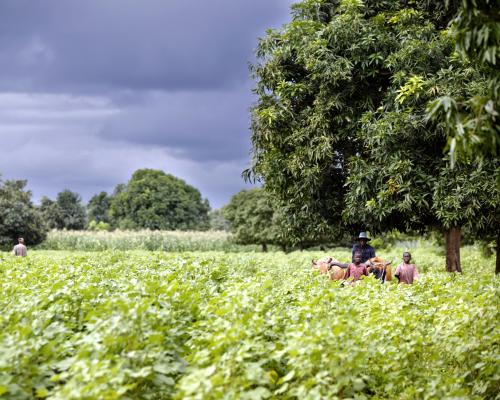
While trying to come up with a pesticide solution to kill off bollworms, Dr Robert Mensah had his eureka moment.
It was the 90s, and in Australia bollworms were devastating cotton farms, with the larvae of these moths chomping up the crops faster than farmers could eradicate them. The farmers were trapped in an arms race with the bollworms, applying more and more pesticide to combat an increasingly resistant species of pest – killing many beneficial insects in the process.
Instead of carrying on down the death spiral, Mensah, an entomologist working at the Cotton Research Institute, began to wonder whether it might be possible to get another insect in to do the job. He experimented and eventually came up with a simple food spray, “a mixture of food ingredients, yeast and sugar-based, diluted in water and applied to crops. It emits an odour which is picked up by beneficial predatory insects and attracts them to the fields where they kill pests.”
He started testing it out in the fields and found that food sprays could entice useful predators such as ladybirds and lacewings. A refuge crop of evergreen alfalfa flowers could also support their populations year-round, so they wouldn’t leave at the end of the season and be poisoned by pesticides in the surrounding landscape. It was the beginning of an international grassroots campaign, in which Mensah has worked with various charities to teach people about this sustainable farming method.
Ever since the dangerous side effects of pesticides became widely known, alternatives have been sought. This approach to farming, which reduces our reliance on pesticides, is called integrated pest management.
“Integrated pest management is a concept that goes back to the 1950s,” says Dr Samantha Cook, a behavioural ecologist at the agricultural institute, Rothamsted Research. Before reaching for pesticides or less harmful substitutes such as pest-killing fungi and bacteria, there are a range of methods you can use to prevent pest populations from building.
“I like to think of it as an IPM triangle. At the base you’ve got management tools: If you rotate crops well, that helps to reduce pest populations building in the soil. Another key element is monitoring pest populations – deciding on thresholds above which the pest population needs to be controlled,” Cook says.
Enticing natural predators is another of these management solutions, and the area in which Mensah specialises.
“Natural enemies are a good way of not relying on insecticides. If we can look after the things that eat the pests, we don’t have to kill the pests ourselves, we can leave that to nature,” Cook says.
In 2005, Mensah took food sprays to Benin, where the Pesticide Action Network (PAN UK) was helping farmers transition to organic farming. There, the misuse of chemical pesticides was seriously damaging people’s health.
“I saw conventional farmers wash their chemical containers in a pool of water that the cattle came and drank from,” said Mensah “Some of them used the chemical containers to store water for their families. The water itself was poisoned.”
“It was very sad because I came from Ghana, in a time when we were using DDT (a synthetic insecticide) to kill fish in the rivers, and then we would bring the fish home and eat them. I then moved to a developed country, where they know the risk posed by insecticides. So this was like going back to my roots and seeing the same thing being repeated.”
“That encouraged me to talk to them and advise them. They listened to me because they know I’m one of them.”
The food sprays – cheap, safe and effective – caught on with farmers in Benin where thousands now use the technique. From there, Mensah took food sprays to southern Ethiopia, where they were also trialled successfully on vegetables as opposed to cotton, and then to Vietnam where they were used successfully on maize.
Another charity, Better Cotton, is now trialling food sprays in India across Maharashtra, Gujarat, and Telangana, where they’ve trained 214,000 farmers to use sprays. But while the benefits are compelling, a spokesperson noted that they can be “time consuming and labour intensive, because farmers are required to produce the formula, and then frequently spray and monitor its application”. This is one of the problems holding back sustainable pest management on a global scale. Pesticide spray may be expensive but they offer farmers a one-size-fits-all solution.
But entomologists tell us insects will inevitably become resistant to any chemical pesticide we invent. Marcel Dicke, professor of entomology at Wageningen University says: “It’s simple, insects are variable in genetic makeup, and you never eliminate 100% of them. Let’s say 1% survives, and that 1% has a way of overcoming the pesticide. They transfer this genetic predisposition to the next generation, and so it spreads among the population. That’s how insects – sometimes very quickly – can become resistant to pesticides.”
Food sprays, says Dicke, are not a silver bullet technology, but they can be helpful in nourishing beneficial insects, alongside a range of other management techniques. “Integrated pest management, which reintegrates a diversity of measures, says that you might use selective chemical pesticides as the very last resort when nothing else works.”
And yet, despite promising results, sustainable pest management is getting harder to introduce, even in the UK where there’s a consumer market for eco-friendly products. This isn’t because farmers don’t want change, says Dr Stephanie Williamson, who was a staff scientist at PAN UK for more than 20 years.
“Pesticides are a very small proportion of farmers’ production costs in the UK, so there’s no real economic driver to reduce insecticide use in this country. And most standard crop insurance will insist that you’ve taken all available measures to stop crop loss, which means using synthetic insecticides,” she says.
“The whole system does not currently support farmers to move towards more agroecological approaches. And unfortunately, the new government is cutting back its funding for nature-friendly farming, which is a real shame, because farmers are rethinking their methods, but there isn’t enough government support for them to change.
“Supermarkets also need to put their money where their mouth is and help farmers shift to safer, more sustainable practices.”
Prof Tariq Butt, a member of the UK Expert Committee on Pesticides, which provides independent advice to the government, says more research needs to be done into the efficacy of food sprays in different climates and agricultural systems.
“It’s fantastic that they’ve utilised local materials and demonstrated that it’s worked for smallholders in Ethiopia and other countries. It shows promise, but there are a lot of questions left to answer about food sprays,” he said.






